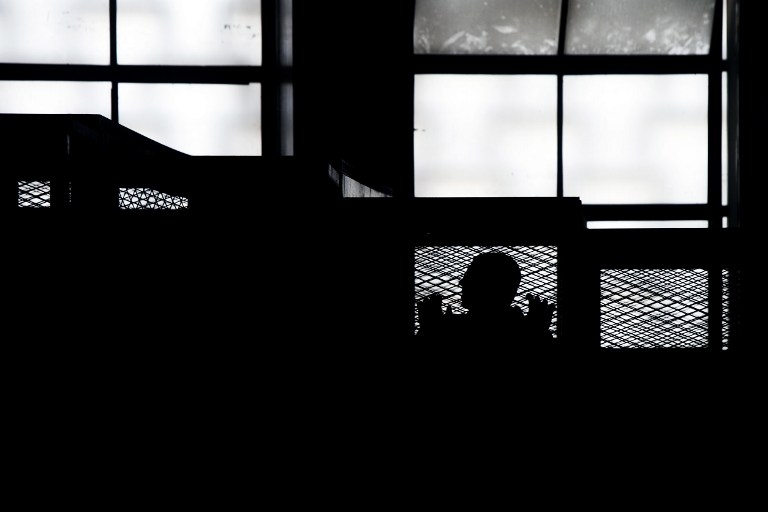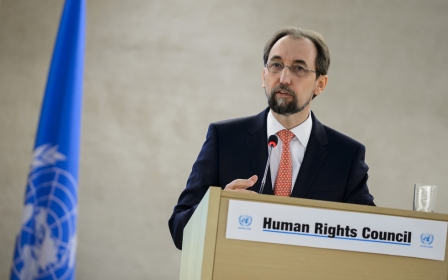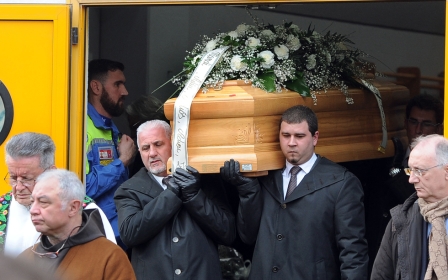A ‘dormant volcano’: The battle of Egypt’s independent unions

CAIRO - A Giza court on Sunday again postponed ruling on a case that could see Egypt’s independent labour unions banned, defence lawyers told Middle East Eye.
The call to ban the independent unions initially came more than a year ago when an affiliate of the state-controlled Egyptian Trade Union Federation (ETUF) filed a lawsuit against a rival federation for independent unions.
The postponement comes as strikes and state violence against protesting workers have risen sharply, according to union leaders and human rights advocates.
Egyptian media have reported strikes among workers at state-owned petroleum companies, the Petrograde companies. Hotel employees protesting at Sharm el-Shiekh hotels have been subjected to police harassment.
“The situation for workers [under Sisi] is very bad,” Tarek Mostafa Ku’aib, a leader of Independent Union of Real Estate Tax Authority Employees, told MEE.
“You are arresting, detaining, and torturing people all to protect a worker’s union that has sold out the workers,” Ku’aib said, referring to several instances when workers were arrested and detained over the past two years.
If the authorities are unwilling to negotiate now, “then they will find the people protesting in the streets,” Ku’aib said.
Giulio Regeni, the 28-year-old Italian doctoral student who was found murdered last month, had been doing research on independent trade unions and wrote an article in the leftist news outlet Il Manifesto, published after his death, about what he had observed.
“The unions’ defiance of the state of emergency and the regime’s appeals for stability and social order - justified by the 'war on terrorism' - signifies, even if indirectly, a bold questioning of the underlying rhetoric the regime uses to justify its own existence,” he wrote.
Since 2011, when the Egyptian Federation of Independent Trade Unions was established and challenged the state’s monopoly, there has been a proliferation of organisations joining four trade and labour unions that existed in relative autonomy before the January uprisings.
“After the revolution, that number grew to over 3,000,” Hoda Kamel, a researcher at the Egyptian Centre for Social and Economic Rights told MEE.
Under the auspices of Ahmed al-Borai, then minister of manpower, a new trade union law was drafted in the wake of the uprisings that recognised the independent unions, but it was shelved, and over the past five years the unions have relied on their “revolutionary legitimacy,” Kamel said.
Ousted President Mohamed Morsi, she said, “was just a different face to the same capitalist system. There were the same people in the ministries and they adopted the same policies. The parliament was not concerned with labour law.”
During Morsi’s tenure, she said, the same security policies existed. She recalled an incident in which police with dogs attacked workers striking at a cement factory during Ramadan. “Why didn’t Morsi punish the Ministry of Interior for this?” she asked.
The repressive policies have continued or worsened under the leadership of current president and former defence minister Abdel Fattah al-Sisi, who removed Morsi through a military coup in July 2013.
Alongside the disregard of consecutive governments, the ETUF has never recognised the independent unions and claims that they violate the law. Now, the lawsuit could make this official.
Both Kamel and Ku’aib said that when confronted with strikes, the state and the media play the “terrorism” card.
Workers, they said, are portrayed as terrorists, or the media paints the protests as driven by the Muslim Brotherhood, which was designated a terrorist organisation in 2013. Independent unions are accused of receiving foreign funding.
The actual challenges that the workers and the unions face, however, rarely get attention, Kamel said.
“There was a time when all the media would come to our press conferences and the halls would be full,” Kamel said, sitting in the ECSER office in downtown. “Now [workers’ issues] get no attention at all.”
Despite the challenges, Kamel maintains a sense of optimism about what may happen next. Had the judge ruled independent unions illegal, “we would have appealed,” she said.
The judge granted independent trade unions a small chance of representing themselves before the court, allowing them their own defence team. Now the Independent Union of Real Estate Tax Authority Employees has its own lawyers, including Khaled Ali, who was a presidential candidate in the first round of elections in 2012.
In any case, Ku’aib predicts continued action.
“The working-class is the biggest [segment of society] in Egypt,” Ku’aib said, likening them to “a dormant volcano”.
“Our movement will not stop,” he said, “even if they ban the independent unions.”
Middle East Eye propose une couverture et une analyse indépendantes et incomparables du Moyen-Orient, de l’Afrique du Nord et d’autres régions du monde. Pour en savoir plus sur la reprise de ce contenu et les frais qui s’appliquent, veuillez remplir ce formulaire [en anglais]. Pour en savoir plus sur MEE, cliquez ici [en anglais].




